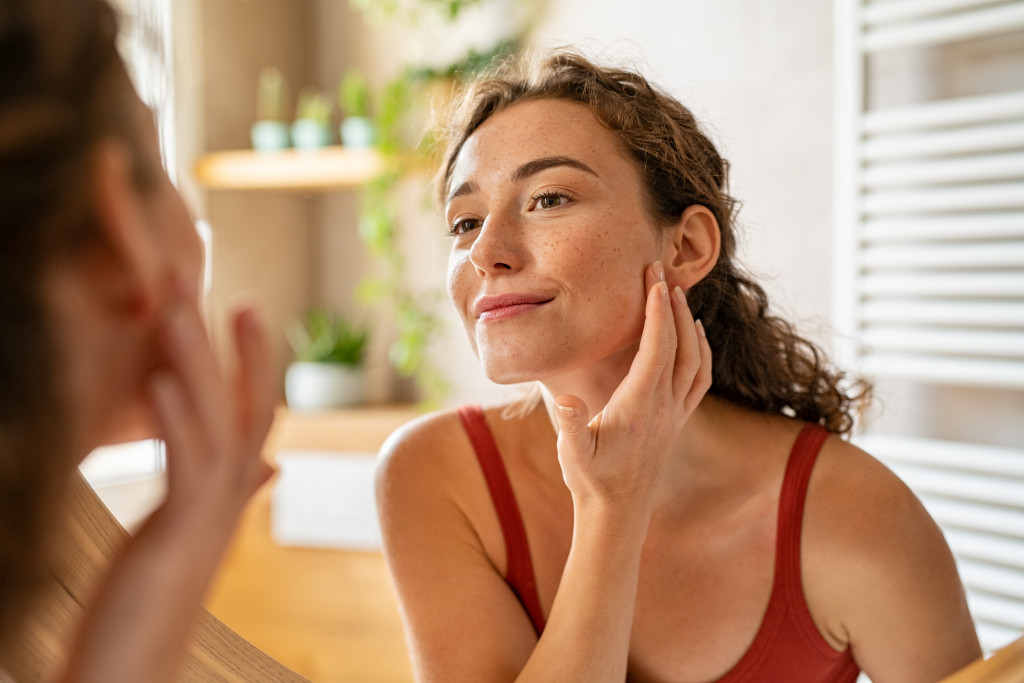Healthy and glowing skin is something that everyone aims for. It can make you look younger, brighter, and in good health. However, you may struggle to maintain healthy and glowing skin for various reasons, including environmental factors, lifestyle choices, genetics, aging, and other existing medical conditions. Fortunately, there are measures that you can take to maintain healthy and glowing skin. Here are four tips that you can use.
1. Stay Hydrated
Drink plenty of water throughout the day to stay hydrated. This helps to keep your skin nourished and supple, as water is an essential nutrient for your body’s cells, including those on your skin. Make sure to drink at least eight glasses of water throughout the day for optimal hydration.
It is also essential to pay attention to the foods and drinks you consume to stay hydrated. Many fruits and vegetables are high in water content and are excellent sources of electrolytes, which help keep your body regulated. High-sodium processed foods can dehydrate, so eating a balanced diet with plenty of fresh fruits and vegetables is crucial.
Caffeinated beverages, such as coffee and tea, can also contribute to dehydration, so limiting your intake is best. Alcoholic drinks are diuretics, meaning they increase the number of fluids leaving the body and can lead to dehydration if consumed in excess. If you do choose to have an alcoholic drink, be sure to stay hydrated by alternating between water and other drinks. If your body detects a lack of fluids, it will send signals that alert you to drink more.
2. Avoid Smoking
Smoking is one of the most unhealthy habits that can damage your skin and make it look dull. Cigarette chemicals have been found to break down collagen, a protein that gives skin strength and elasticity. This leads to dry and wrinkled skin, making it appear aged. Smoking also restricts blood flow to the skin, depriving it of oxygen and nutrients, which can cause discoloration.
Apart from damaging your skin, smoking can also lead to other health issues. Smoking has been linked to several serious diseases, such as cancer and heart disease. It can also increase the risk of stroke and COPD (chronic obstructive pulmonary disease). In addition to this, smoking is known to increase blood pressure and reduce your ability to exercise. All of these factors can have a severe impact on your overall health and well-being.
To protect your skin from the effects of smoking, it’s important to quit if you currently smoke. This can be difficult, but resources are available to help you transition. Your doctor or healthcare provider can provide advice and support to help you quit. If you’re looking for a different support system, consider joining a smoking cessation program or speaking with a counselor specializing in quitting smoking.
3. Protect Yourself From the Sun

Excessive exposure to the sun’s UV rays can cause premature aging, wrinkles, and other skin problems. To protect yourself from these issues, wear sunscreen with at least SPF 30 when outdoors and limit your time in direct sunlight whenever possible. Additionally, wearing protective clothing such as a hat and sunglasses can help to protect your skin from the sun further.
It is important to remember that UV rays can penetrate clouds, so you should use sunscreen even on cloudy days. Sunscreen should also be reapplied frequently throughout the day to ensure optimal protection from the sun’s harmful rays. It is also vital to avoid sunlamps or tanning beds, as these can be just as damaging as the sun’s rays.
In order to stay safe in the sun, it is vital to check the UV index before engaging in outdoor activities. The UV index provides information on how intense the sun’s UV rays are on a given day and measures the strength of UV radiation from low (1-2) to extreme (11+). When the index is high, it is important to limit time spent outdoors, seek shade when possible, and wear protective clothing.
4. Take Care of Your Skin
Taking care of your skin is vital for maintaining healthy and glowing skin. Make sure to regularly cleanse and moisturize your face and exfoliate it once a week. Additionally, you can use products like masks or serums to help nourish and protect your skin.
Try to find a skincare routine that works for you. Everyone’s skin is different, so what works for one person may not work for another. Natural products such as coconut oil or aloe vera are excellent options when choosing a cleanser or moisturizer. You can also use toners to help balance your skin’s pH and make it easier to absorb products.
You should also consider cosmetic skin solutions if your skincare routine isn’t doing enough to keep your skin looking healthy. Professional treatments can help remove dead skin and improve the condition of your complexion. Treatments are also available for more stubborn skin conditions such as acne scars or pigmentation.
In Closing
When it comes to maintaining healthy and glowing skin, there are many things that you can do. From drinking plenty of water, avoiding smoking, protecting yourself from the sun, and taking care of your skin, these four tips will help you maintain healthy and beautiful skin. So keep these tips in mind and enjoy your healthy and glowing skin!


